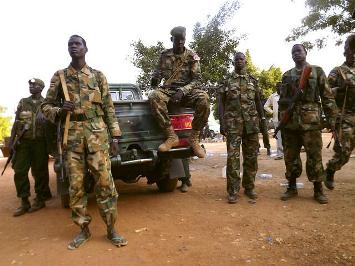S. Sudan army denies involvement in Jonglei attack on UNMISS base
April 18, 2014 (JUBA) –The South Sudanese army on Friday rejected accusations that it backed attacks on the internally displaced persons at the United Nations base in Jonglei, saying it alerted the world body of youth movement towards its location.

“But the state authorities communicated to the United Nations the message of the youth going to present their memo. The essence of notifying the United Nations by the state authorities was to be on alert,” he added.
The military officer was reacting to the public outcry over the manner in which what was initially viewed as a peaceful presentation of the memo to the UN against the alleged celebration of the fall of Bentiu town to the rebels by some members of the internally displaced persons, turned violent.
“The SPLA did not play any role in this incident and does not encourage such act. It is the national army with the constitutional mandate to provide protection to any citizens and their properties regardless of their opinions, whatever the reasons may be”, Ayuen explained.
But multiple human right activists and survivor accounts point accusing fingers at the government, claiming the demonstrators who attacked the displaced were purely members of the armed forces and police service disguised as youth, some whom wore military and police uniforms.
“What happened in Bor, cannot, by any standard of judgment be claimed to be a mere youth activities. It was something well planned. The government has strong knowledge. It knows what was happening otherwise they [demonstrators] would not have been allowed to carry weapons if it was a mere presentation of the memo,” Dut Morris, a resident of Juba told Sudan Tribune on Monday.
He claimed there were people in the government working against President Salva Kiir by engaging in activities likely to cause ignite public uprising.
“I was in Khartoum when people came out to remove former president, Jafar Nimeri. People who positioned themselves as close to him were the ones who later staged against a coup against him,” Dut explained.
“This is what I see happening to our president. There are people who appear to be working for him but in reality they are working very hard for his downplay”, he added.
Anthony Sebit, key member of the civil society group warned that the seeds of genocide have already started to appear in the ongoing conflict in the country.
“What is happening now must been seen with fully opened eyes. The international community must come out with a clearly stated action plans to resolve this conflict, otherwise the country risks going the Rwanda way,” Sebit said in an interview.
He further said the grave human right abuses so far committed in South Sudan should have caught the attention of the international community and the UN Security Council, but wondered why less attention was being paid to its “intensity and horror”.
“The United Nations Security Council should form a fact finding committee to carry independent investigation and refer the situation to the International Criminal Court (ICC), which investigates war crimes, crimes against humanity, genocide and the crime of aggression,” Sebit told Sudan Tribune.
Under the Rome Statute, the ICC can investigate crimes in countries that have joined the institution, but it can only pursue crimes in non-member states if authorised by the Security Council, as was the case with Libya and Darfur in western Sudan.
“Only the Security Council can change the situation with immediate effect. With the help of the international community must come up with impartial and just action to secure accountability, fulfill the responsibility to protect, put human rights right and stop grave human rights violations from undermining peace and security,” he said.
Survivors of the Bor attack claimed it was well organised as the systematic slaughter of men, women and children occurred allegedly in full view of area authorities.
“The attack on displaced persons in Bor highlights the extent to which the method of prevention of genocide has utterly failed. If civilians could be attacked inside the base of the United Nations without immediate action, the assertion never again will something like what happened in Rwanda be allowed to repeat itself is mere political statement,” said Moses Duku, who hails from South Sudan’s Central Equatoria state.
“It is statement which lacks commitment,” he added.
(ST)
